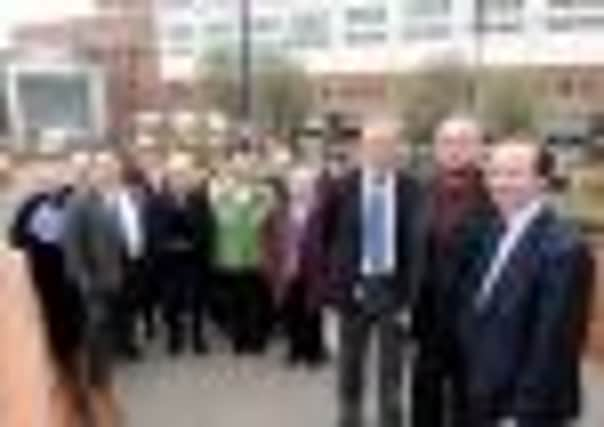Obesity clinic is a weight on the taxpayer


THE logic used to support the huge amount of taxpayers’ money spent by the Rotherham Institute of Obesity (RIO) is seriously flawed (Yorkshire Post, April 13) but seems to be presented by many people as an ideal solution to bring relief to future NHS budgets, and, indeed, to save it from future destruction.
Firstly, the facts are that the RIO has spent £775,500 treating 1,600 overweight adults and 200 children in the last 18 months and over this period their total weight loss has averaged at seven pounds each, meaning that it has cost £58 for every pound lost and a total of £406 for each person.
Advertisement
Hide AdAdvertisement
Hide AdIt is claimed by Dr David Haslam, chairman of the National Obesity Forum, that even with such a small weight loss per person, this would still lead to cost savings for the NHS due to the reduction in treatments for diabetes, blood pressure and cholesterol.
This logic is similar to saying we should pay prisoners £10,000 if they do not re-offend within 12 months of release as this would benefit the taxpayer by saving the enormous costs of re-offending.
Now, wouldn’t it be better if people accepted they have brought the condition they are in upon themselves and didn’t become obese in the first place. This would achieve maximum benefits for the NHS because taxpayers wouldn’t be asked to spend anything at all.
The NHS is being used more and more as a social club to medically correct conditions which could and should be the individual’s responsibility and removing this responsibility will not encourage any change in habits.
Advertisement
Hide AdAdvertisement
Hide AdThe small weight loss of seven pounds per person was, however, only recorded on completion of the course, and no follow up data was made to show if this weight loss was kept or improved.
With too many weight loss programmes, the weight initially lost is not only replaced very quickly at the end of any treatment, such as a diet, but often results in the person becoming heavier than when they began. We are unaware whether this happened in this case because no one thought of finding out.
One thing that never seems to change is that those who look after themselves are largely ignored, with applause bestowed on those who have shed mountains of fat they shouldn’t have been allowed to put on.
From: Jane Jefferson, Public Health Specialist NHS Stockport.
Advertisement
Hide AdAdvertisement
Hide AdAs someone who commissions weight management services in another area, I am very aware of the difficulties people face losing weight, and the prevalence of the idea that there is a magic bullet (such as bariatric surgery) that will solve obesity.
The Government’s independent science office’s Foresight report on obesity showed that it is extremely difficult to tackle the problem of excess fat, both individually and structurally, and that our whole society is geared to making people more obese.
People with weight problems already struggle to achieve lasting weight loss, and face mounting stigmatisation of their situation.
RIO receives a lot of public money which you are right to scrutinise, but the problem they are tackling is made more difficult by overly-critical reporting.
Best care for child patients
Advertisement
Hide AdAdvertisement
Hide AdFrom: Professor Martin Elliott, Safe and Sustainable Steering Group member and representative of the British Congenital Cardiac Association, Elmete Lane, Roundhay, Leeds.
I WRITE in response to recent letters from AE Raine (Yorkshire Post, April 4) and M Hellawell (Yorkshire Post, April 12) regarding the future of Leeds Children’s Heart Unit.
Changes to the way children’s congenital heart services are delivered will be a concern for many families and staff – especially if those proposed changes require children to travel to another centre for surgical care. However, clinicians, professional bodies and leading heart charities agree that current services, including those in the North of England, are simply not sustainable.
Pooling surgical expertise into fewer larger centres to ensure centres perform the necessary number of procedures a year to maintain and develop their expertise would mean better outcomes for chldren – this has got to be the priority.
Advertisement
Hide AdAdvertisement
Hide AdSafe and Sustainable has followed a robust process in developing the options which included assessing the amount of time it would take to get to a child needing emergency care. In an emergency the goal is not for a child to reach a surgical centre in the shortest possible time but rather getting the highly specialist team to the child so they can stabilise them.
Most heart operations are not carried out while the child is still severely ill – this could be dangerous. We’ve ensured our standards on retrieval comply with those developed by the Paediatric Intensive Care Society.
Most children only need to have one or two major heart operations in their young lives. The care after that can and should be delivered as close to home as possible, by paediatricians trained in cardiology with the help of specialist liaison nurses.
Safe and Sustainable has recommended that this way of working is improved and developed in networks, built around a specialist surgical centre. We want to provide the best care in the best setting.
Advertisement
Hide AdAdvertisement
Hide AdI am also keen to rebut any suggestions that the proposed changes are inspired by a motivation to save money. The financial analysis carried out to date shows that pooling surgical expertise and expanding local services would cost more, not less in the first few years.
However, no decisions have been made yet. Whether you fill out a response form, write a letter or attend one of the consultation events, I urge you to have your say. All responses will be considered.